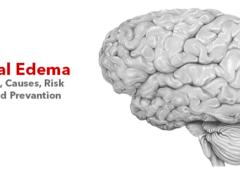What is cerebral edema?
Cerebral edema is also known as brain swelling. It’s a life-threatening condition that causes fluid to develop in the brain.
Such fluid raises the pressure inside the skull — more commonly called intracranial pressure (ICP). Increased ICP will reduce the flow of brain blood and reduce the oxygen your brain gets. The brain needs an uninterrupted flow of oxygen to function properly.
Swelling is the body’s response to injury. It can sometimes be treated with medication and rest.
Brain swelling can be very difficult to treat. It can also cause irreversible damage. The swelling can occur throughout the brain or in certain areas. Left untreated, cerebral edema can be fatal.
Symptoms
Symptoms of Cerebral edema vary, depending on the severity and the cause. Usually, they begin suddenly. You may notice any of these symptoms:
- Headache
- Neck pain or stiffness
- Nausea or vomiting
- Dizziness
- Irregular breathing
- Vision loss or changes
- Memory loss
- Inability to walk
- Difficulty speaking
- Stupor
- Seizures
- Loss of consciousness
When to call your doctor
Brain swelling is a serious condition that can cause long-term damage to your memory and ability to think. It may also be fatal if treated too late. If you begin to experience side effects after a fall, accident, or while fighting off an infection, visit a doctor immediately.
Causes
Cerebral edema-related ICP can have a number of different causes including:
- Traumatic Brain Injury: A traumatic brain injury is acute trauma, such as from a fall or vehicle accident.
- Ischemic Stroke: An ischemic stroke occurs when a blood clot is blocking the oxygen supply to the brain. A lack of oxygen can damage cells in the brain and can cause swelling and pressure.
- Brain Tumour: A brain tumor can press against other areas of the brain or prevent fluid from leaving the brain, causing elevated ICP.
- Infection: Bacterial infections or virus infection may cause swelling in the brain. Encephalitis, for instance, is an infection that induces inflammation in the brain, which can result in elevated ICP develop.
- Brain Hemorrhage: A brain hemorrhage occurs when a blood vessel in the brain ruptures and leaks. This causes inflammation and an increase in ICP.
- High Altitude: Cerebral edema can also occur above altitudes of around 4,000 meters.
Risk factors
Cerebral edema is present with much common cerebral pathology and risk factors for the development of cerebral edema will depend on the cause. The following were reliable predictors for development of early cerebral edema in ischemic strokes.
- Younger age
- Higher severity of symptoms on the National Institutes of Health Stroke Scale
- Signs of current ischemia on clinical exam
- Decreased level of consciousness
- Hyper-dense sign of the artery and greater affected area on CT imaging
- Higher blood glucose
Complication
Because cerebral edema can be due to serious diseases, failure to seek treatment can result in serious complications and permanent damage. Once the underlying cause is diagnosed, it is important that you follow the treatment plan specifically designed for you by your health care professional to reduce the risk of potential complications including:
- Cognitive impairment
- Developmental delay
- Learning disability
- Loss or alteration of sensation
- Muscle weakness
- Paralysis
- Personality changes
- Physical disability
- Unconsciousness and coma
How to Prevent Cerebral Edema
Preventing cerebral edema involves taking measures to protect your head. Some options include:
- Using a helmet during sports or physical activities to prevent unexpected brain injury
- Controlling your blood pressure and cholesterol to prevent heart disease and stroke
- Wearing seat belts when travelling in a vehicle
- Slowly ascending to high elevations to avoid HACE
- Avoiding smoking to reduce the oxidative and inflammatory risk for stroke.
- Monitoring your blood pressure and cholesterol to reduce your risk of a stroke.

Leave a Reply
You must be logged in to post a comment.